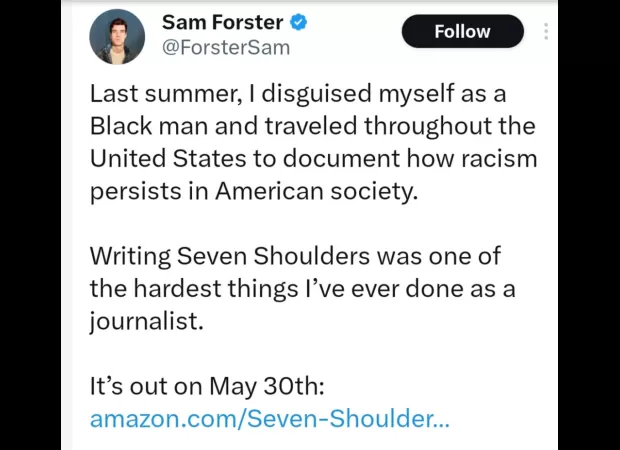Canadian writer researches American race relations by donning Afro wig and using dark foundation.
Canadian writer faces criticism for using blackface while writing about race in America.

A writer from Canada, Sam Forster, has recently come under fire for his controversial book on American race relations. The book, which he claims to be the most important one on the topic, has caused quite a stir after it was revealed that Forster went to extreme lengths to research it. In fact, he even disguised himself as a Black man during his travels in the United States.
Forster, who has previously written for publications like The National Post and The Spectator, faced backlash after promoting his self-published book titled "Seven Shoulders" on social media. He later deleted the tweet, but not before it caught the attention of many, who were quick to criticize his methods.
In the since-deleted tweet, Forster had revealed that he disguised himself as a Black man during his travels in the US to document the persistence of racism in American society. He also shared a link to his book, which he claimed was one of the hardest things he has ever done.
According to The Independent, Forster's book includes details of his journey hitchhiking across the country while disguised in blackface. He used a synthetic Afro wig, colored contact lenses, and Maybelline foundation in the shade "Mocha" to cover his skin. He also stopped in cities like Nashville, Birmingham, Atlanta, Los Angeles, Las Vegas, Chicago, and Detroit, documenting his experiences and interactions with people while in disguise.
While the book does include interviews with Black leaders, their names were redacted and they were not aware of the blackface element of the project. This revelation only added fuel to the fire, with many Black journalists and authors criticizing Forster's methods of research.
The Nation's legal correspondent Elie Mystal took to Twitter to express his thoughts, writing, "Option A: Talk to actual Black people. Option B: [whatever in the Tropic Thunder F*** this is]." His sentiment was echoed by others, including New York Times political reporter Astead Herndon, who asked Forster to share a photo of his blackface disguise.
In response to the backlash, Forster deleted the promotional tweet and later posted a lengthy message explaining his reasoning for the book. He clarified that his intention was not to understand the experience of being a different race, but rather to demonstrate how a person's perceived race can result in differential treatment.
He also addressed the criticism of featuring non-Black voices in his book, pointing out the contradiction of some people wanting more Black voices to be heard, while others lamenting how few people take Black voices seriously. Although he did not offer a formal apology, Forster acknowledged that his form of writing may not be for everyone and admitted to using a brash marketing tactic to attract attention.
In the end, Forster wiped his Twitter account clean of any promotion for his book, which has received a low rating on Amazon. The controversy surrounding his book has sparked important discussions about the appropriate methods of researching and writing about race relations.






